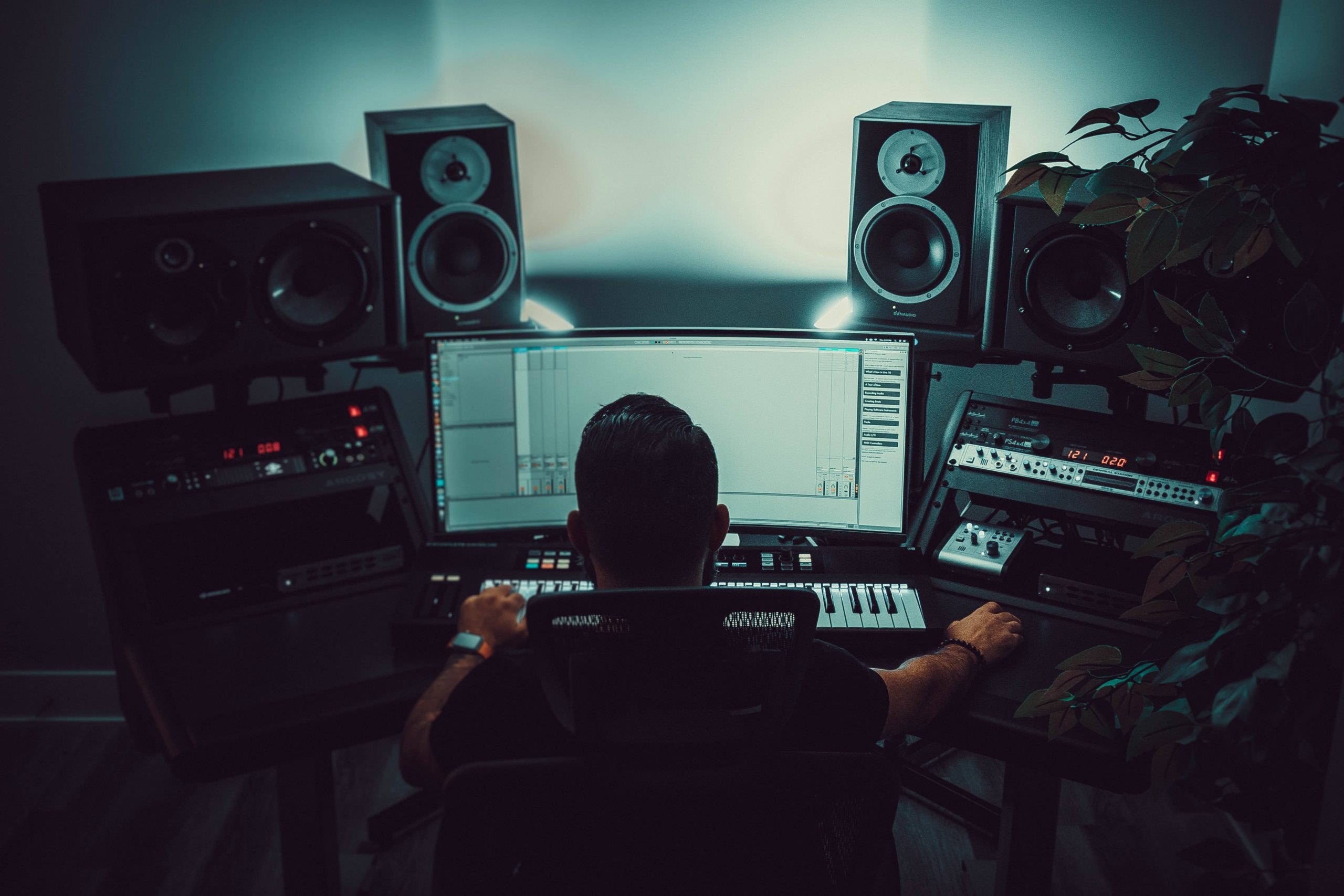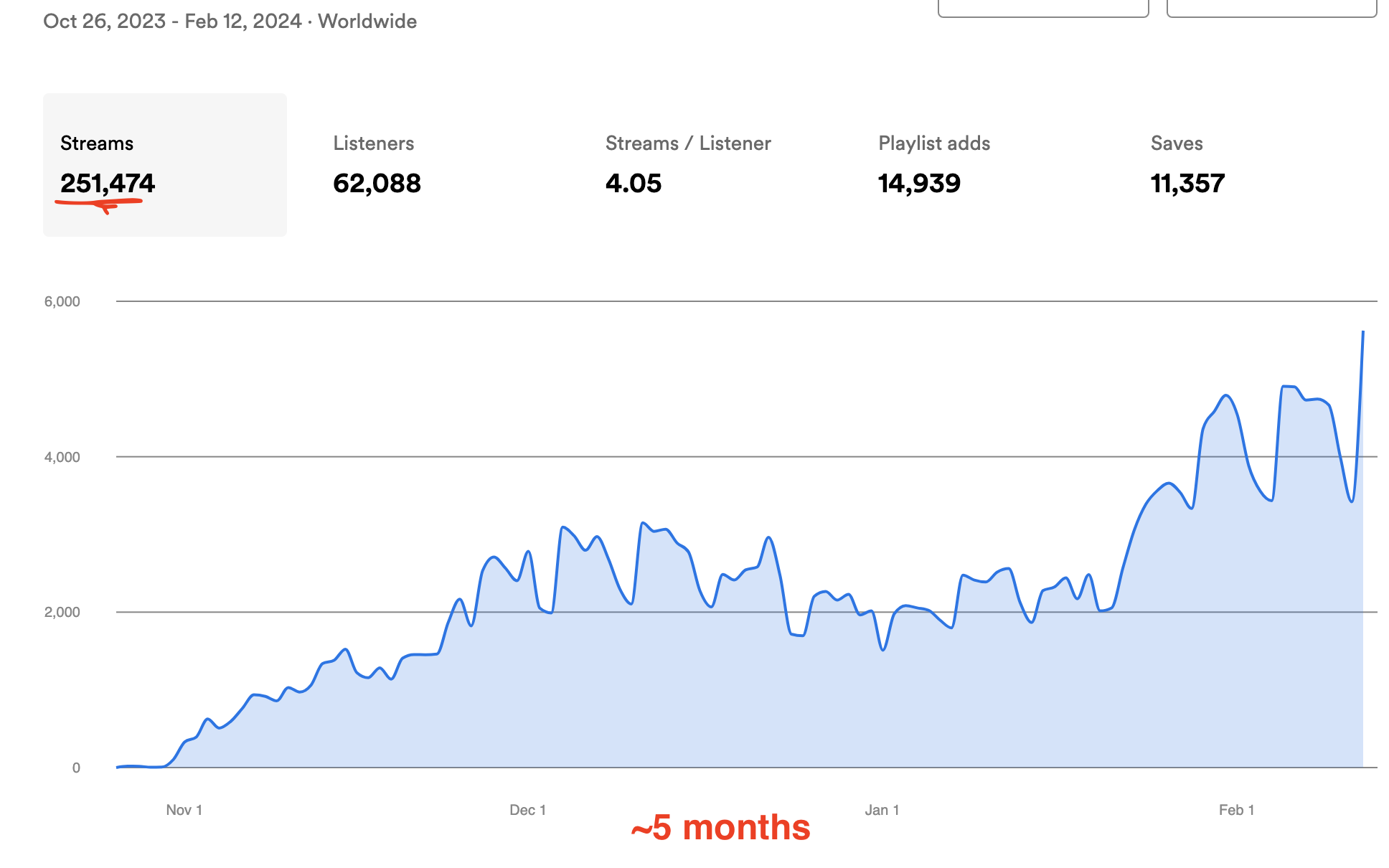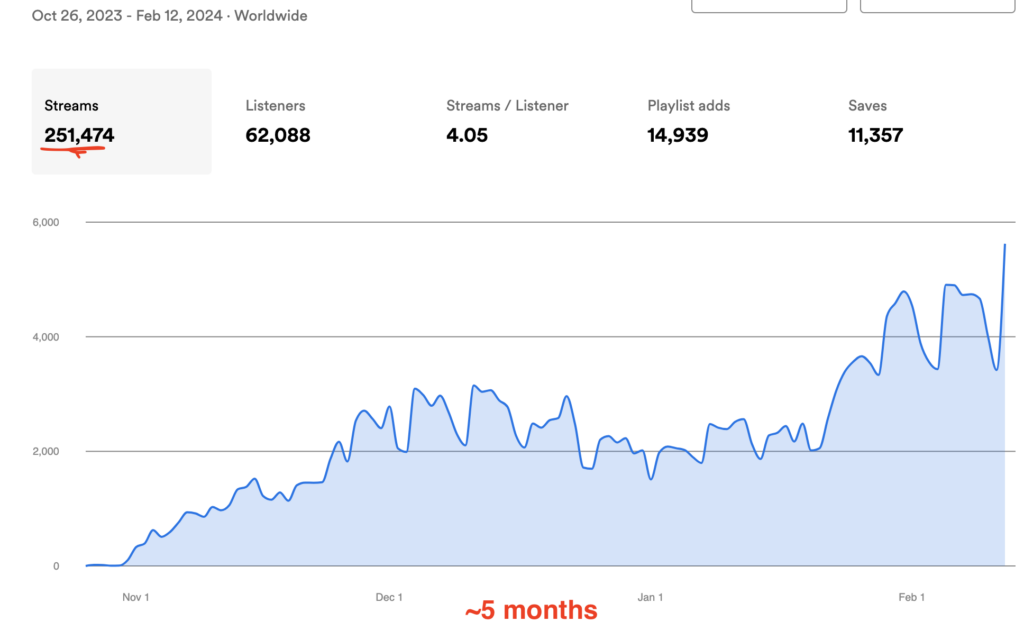Have you ever wondered how the best albums came to life?
Were they the result of the immense talent of creative individuals or the collective work of artists, engineers, and managers?
Over the last 60 years, an ocean of albums has been produced by artists exploring all sorts of genres. Yet, each of those publications results from a different mix of human qualities: the meeting of minds, a delicate balance between freedom of expression and business profitability.
While the role of musicians and engineers is defined and clear to most, the music producer may seem like a mystical figure at times: a person who can single-handedly change the sound of a band and lead it to success (or failure).
In this article, let’s peel back the curtain.
What does a music producer do?
Music producers bring artists’ visions to life.
In other words, it’s complicated.
Producers oversee multiple aspects of an album’s creation, from choosing the personnel working with the artists to guiding the selection and shaping of sounds. Often the role of the music producer combines creative and managerial elements, which means they influence the song creation process at all levels.
In the ever-changing context of digital production and distribution, the figure of the music producer has changed over the years: from technician to manager, from coordinator to mentor. The digital era has magnified the importance of producers, as it became even clearer that they’re the ones connecting artists, engineers, and audiences to create a successful work of art.
Record producers: a brief history
At the early stages of the album era (until the late ’50s), record producers mainly were in charge of handling finances, music equipment and personnel; in short, they were the ones who would ensure that the album’s creation would run smoothly.
From the early ‘60s, things started to change. The possibilities provided by multitrack recording and electronic instruments allowed musicians to explore new sounds. However, the technical knowledge necessary to maximize the potential of these new tools was beyond most artists’ abilities.
The record producers were the only ones who had a complete overview and understanding of the technical requirements necessary to produce the album. Furthermore, by working for the main record labels and producing hundreds of albums every year, they knew the best engineers and developed an almost infallible music taste. This mix of knowledge, expertise, and an excellent ear for music, transformed the figure of the record producer into a versatile supervisor/band member who can guide the sound of an album until it reaches the ideal quality according to the bands and their audience.
The Wall of Sound was a revolutionary approach to recording music. Developed by music producer Phil Spector in the early ’60s, the Wall of Sound involved recording the same instrument multiple times while carefully adding layers upon layers of soundscapes to enrich the recording further. The resulting depth and richness of sound were unheard of at the time, and Spector went on to produce Let It Be by the Beatles and Bridge over Troubled Water by Simon and Garfunkel using that technique.
The advent of digital music production
If the role of record producers was nebulous from the start, digital music production made it even harder to define. Since the early ’90s, digital audio workstations (DAWs) like Cubase and Pro Tools gave everyone access to a library of music production tools at a fraction of the price of an analogue recording studio. This change significantly affected some genres, like hip hop and electronic music, which suddenly had all the tools necessary to make music without stepping into a recording studio.
So, what happened to the music producers? They evolved once again.
By the early 2000s, anyone could use a laptop to produce an entire album. However, the creative and technical processes involved in music production were still relatively complex and tended to be left in the hands of people who could master both the technical and creative side of music. Hence, a new generation of music producers rose, one that could easily predict the music trends and produce music accordingly, while being in charge of the financial aspect of the publication.
The role of music producers today
Over the last twenty years, music producers have shifted more towards the creative side, but without losing sight of the business aspect of music. Especially in pop and hip-hop music, producers can overview the entire creative process, from beat-making to the final song mastering, becoming the de facto creators and managers of a release.
The simplified recording process also helped musicians get all the necessary tools to handle the production process themselves. As a result, many artists today produce an album independently without the support of labels and producers because they acquired the necessary technical knowledge to do so: something that was extremely hard to achieve (and expensive) back when everything was made analogically.
Music producer vs audio engineer
Simply put, while a music producer affects various aspects of the music production process, from budget management to bringing their vision into the album’s sound, an audio engineer is “only” in charge of recording, mixing, or mastering an album in the best possible way.
The audio engineer is, as you may have guessed, a technician. Does that mean audio engineers don’t add their creativity or vision to the albums they help bring to life? Absolutely not. Their experience and taste add value to the music, and the right audio engineer can enhance the quality of a music release in ways that no one can, not even the producer or the musicians themselves.
The skills required to be a music producer
The primary role of music producers is to create and maintain a balance between the artists’ creativity and the business side of music. The creative role of producers requires them to have not only have music taste but also a sense of what might work for a specific artist.
By guiding the production process throughout, they add their feelings and expertise to the finished recording, which ultimately has to make everyone happy: the artist, the audience, and the record label.
Does it sound complicated? That’s because it is.
Successful music producers combine various transversal competencies that make them invaluable in today’s music industry. Some of the greatest producers were able to revitalise the career of long-forgotten artists just by reinventing their sound and image (remember the American Series by Johnny Cash?).
Some of the greatest music producers
To give you some concrete examples of what music producers do, let’s look at a few of the greatest:
George Martin
Often referred to as the Fifth Beatle, George Martin was part of the first wave of music producers who greatly influenced the albums they worked on. Martin helped define the Beatles sound, and many of their orchestral arrangements were written or performed by him.
Brian Eno
As a big fan of ambient music, Brian Eno holds a special place in my heart. Creative, multifaceted, iconic: for six decades, Eno has created some of the most poignant music soundscapes and achieved great commercial success while staying in control of his artistic career.
Rick Rubin
In the early 2000s, Rick Rubin revolutionized the way albums sound. The owner of Def Jam Records and American Recordings could jump from hip-hop to heavy metal with such confidence that he became THE music producer to associate with at the time. From Johnny Cash to Slayer, from Jay-Z to Adele: Rick Rubin produced them all and (at least for a while) everything he touched would turn to gold.
Dr. Dre
The ex-NWA has been one of the leading hip-hop producers since the early ’90s for a couple of reasons. First, he’s been able to adapt his style to the latest musical trends while keeping in touch with his early musical background; second, Dre has creative intuitions that allow him to connect with and produce the most talented artists. Snoop Dog, Eminem, 50 Cent, and Anderson.Paak are just some of the artists who worked with Dre, but you might say that his style influenced an entire generation of rappers and producers.
Prince
To me, Prince was an absolute genius.
Prince Rogers Nelson was an incredible producer, performer, composer, multi-instrumentalist, and talent-scout (think of Sheila E. and all the other musicians who worked for him and became successful afterwards). In the ’80s, when in the music industry money was abundant and creativity superfluous, Prince was able to release fantastic music at an astonishing rate: written, recorded, and often performed, exclusively by him.
Mark Ronson
Mark Ronson is defining the sound of the 2020s by producing one hit after the other. By working with artists like Lady Gaga, Bruno Mars, Queens of the Stone Age, Lily Allen and Duran Duran, Ronson created a defined sound blending different electronic elements into high-quality rock and pop music.
Recommended readings
I want to recommend a few readings which are not strictly related to music production but rather give an overview of what it means to experience the music business as a whole, from composing to releasing music. If your objective is to become a producer, these books will offer you the insight you need to be prepared when your career starts picking up pace.
How Music Works, by David Byrne
A comprehensive overview of what it means to be a musician and how music is perceived, both within and without the music industry. In this book, David Byrne describes the evolution of music and musical taste and the music production process he’s experienced first-hand during his four-decade-long career.
Rick Rubin: In the Studio, by Jake Brown
Honestly, this is not the best book ever written, but it’s still an interesting collection of stories that explains the unique philosophy of Rubin. In The Studio describes Rubin’s extensive music knowledge and approach to production, which allowed him to release countless hits and transcend musical genres as no other producer has ever done.
A Year with Swollen Appendices, by Brian Eno
A year in the life of one of the greatest producers of all time. Brian Eno is a formidable producer because he’s consistently creative: therefore, there’s no better way to discover his secrets than by reading his journal. Covering the year 1995, A Year with Swollen Appendices shows Eno’s creative process and thoughts on a variety of topics, from ambient music to copyright. I highly recommend this one.
Final thoughts on the role of music producers
To be a music producer requires such a variety of skills, from business to music composition and audio engineering, that you can’t possibly become one by just reading books.
If you want to become a music producer, I suggest you start by simply producing one album.
By diving into the world of music production and starting small, you’ll get an overview of what it takes to release an album and all the technical knowledge required to publish the best possible music.
I’d assume most of the music producers out there developed their sets of skills over time, learning new things as they produced more and more albums. Ultimately, this approach will allow you to develop your own style, which will differentiate you in the eyes of the audience and the musicians you’ll collaborate with.
It’s essential to understand and study the approach of the people who defined the role of music producers. Creatives like Brian Eno and Prince were able to fully control their artistic career because they acquired the skills necessary to free themselves from the constraints of labels and distributors. Likewise, producers like Rubin, Ronson, and Dr. Dre can evolve and jump from genre to genre because they clearly understand and embrace the current music trends.
I’d suggest you start from the aspect of music production that interests you the most, and later on expand your skills. Are you a good beat maker? Are you more into the business side of music? Is audio mastering your forte? Whichever aspect you choose first, make sure you master it and then move on to the next skill as you keep producing music.








